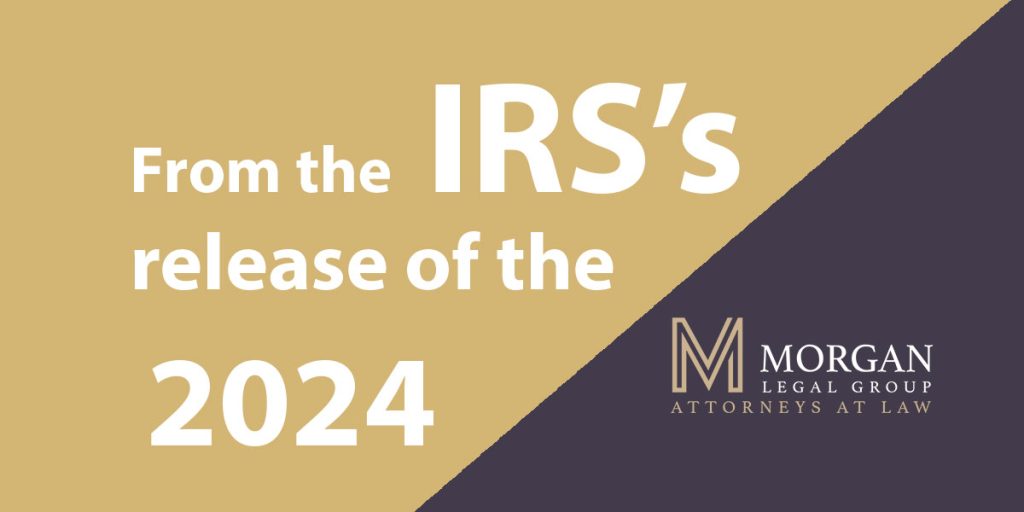Estate Planning in 2024: Understanding the IRS’s New Exemption and Exclusion Amounts
Estate planning is a crucial aspect of financial management and wealth transfer. Each year, the Internal Revenue Service (IRS) makes adjustments to the estate and gift tax exemption and annual gift exclusion amounts. In November 2023, the IRS issued Revenue Procedure 2023-34, providing vital updates for estate planning practitioners and individuals seeking to optimize their estate plans in 2024. This essay will delve into the IRS’s latest release, exploring the implications of the 2024 lifetime exemption and annual gift exclusion amounts on estate planning strategies.
Understanding the 2024 Lifetime Exemption:
One of the key highlights of Revenue Procedure 2023-34 is the adjustment of the estate, gift, and generation-skipping transfer tax exemption amount for 2024. The IRS has set this amount at $13,610,000, marking a significant increase from the previous year’s exemption of $12,920,000 for transfers made in 2023.
This adjustment reflects the ongoing impact of inflation on estate planning. The increase in the basic exclusion amount means that individuals can now transfer an additional $690,000 (or $1,380,000 for married couples) free of transfer tax liability in 2024 compared to the prior year. This presents an opportunity for estate planning attorneys to work closely with clients to assess whether they should capitalize on these planning opportunities.
Impact on Estate Planning Strategies:
The rising exemption amount carries significant implications for estate planning strategies. Individuals and families with substantial estates may find themselves more flexible in their planning. Here are some key considerations:
- Wealth Transfer: With the increased exemption, high-net-worth individuals have the opportunity to transfer a more substantial portion of their wealth to their heirs without incurring federal estate tax. Real estate planners can explore strategies like gifting, trusts, and family-limited partnerships to leverage the higher exemption amount.
- Sunset Provisions: It’s essential to note that the enlarged exemption amount is set to sunset at the end of 2025. Estate planning professionals should inform their clients about this provision and recommend taking advantage of the increased exemption while it is available.
- Annual Gift Exclusion: Another noteworthy change is the annual gift exclusion, which has been raised to $18,000 for the calendar year 2024, up from $17,000 in 2023. This allows individuals to make tax-free gifts of up to $18,000 per recipient. Estate planners can assist clients in optimizing their gifting strategies to minimize their taxable estates.
Massachusetts Estate Tax Update:
In addition to federal changes, it’s important to consider state-specific developments in estate planning. For instance, in October 2023, Massachusetts Governor Maura Healey signed “An Act to Improve the Commonwealth’s Competitiveness, Affordability, and Equity.” This legislation doubles the state’s estate tax exemption amount to $2 million, effective retroactively for decedents dying on or after January 1, 2023.
Under the previous law, estates valued at more than $1 million were subject to tax on the entire estate value. The Act introduces a nonrefundable tax credit of up to $99,600 to cover the first $2 million of the estate, sparing taxpayers from paying tax on the entire estate value. The Act also reduces the state’s short-term capital gains tax and modifies the “millionaire tax” for joint filers.
This development has significant implications for Massachusetts residents and estate planners. Those who filed estate tax returns earlier in the year may seek refunds based on the new exemption amount. Estate planning attorneys should advise affected clients on adjusting their estate plans to align with the updated exemption.
Conclusion:
Estate planning is a dynamic field influenced by federal and state-specific developments. The IRS’s release of the 2024 lifetime exemption and annual gift exclusion amounts provides valuable opportunities for individuals and families to optimize their estate plans. Understanding these changes, their implications, and the broader legal landscape is essential for effective estate planning. Estate planning professionals should guide their clients through these developments to ensure their plans align with their financial goals and the evolving legal framework.






